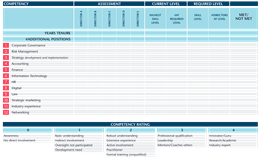
Click image to view full size
A board skills matrix is an essential tool that promotes balanced, appropriate and diverse skills among governance leaders. This template can be used to empower constructive discussion, enable self-assessment, guide recruitment and support succession planning.
How to use the matrix
- The board should agree in advance of the self-assessment exercise the required levels of competency. This will help to avoid bias towards the current assumed competency levels. Effort should be made to encourage openness, honesty and collective learning goals.
- Request self-assessment by board members using the scoring matrix. The scoring matrix builds from 0-4; it is acceptable for members to score 0 in specialist areas outside their remit such as law and accounting. Honesty should be actively encouraged.
- Complete the matrix (example below). Consideration should be given to specific industry and organisational skills in addition to the generic ones listed, the matrix must be relevant; property, asset management, entrepreneurship, health and safety, practitioner skills (doctor, architect), global operations etc.
- Analyse and agree next steps:
a. Address competency gaps
Risk management – internal training
Law – succession planning/recruitment
Networking – discussion with directors C&D, look at reasons and impact, schedule/formalise essential activities as board item
b. Consider risks
Director C what value? Was this a positive diversity recruit, in which case is there a development plan? Was it a network recruit?
Director B tenure? Important skill set, what is the succession plan for when tenure ends (9years max for chair)
Director E overboarding? May need to be tolerated due to exceptional digital skills which are in short supply, manage carefully
Industry experience exceeds requirements, is board too insular in its thinking, how is this mitigated?
- Review required levels in line with strategic change.
- Review self-assessments annually to encourage continuous personal development.
- If required to report externally (as currently required in…